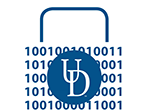Join us in welcoming Patricia "PC" Shea, UD's first Chief Privacy Officer! Read about PC and other hot topics in privacy for Data Privacy Day, January 28th.

|
|
Welcoming UD's new Chief Privacy Officer
AI's new darling? You, of course!
Have you ever wanted your name in lights? How about your face in pictures? Or, more specifically, how about your data being sized and served up by AI’s formidable—and controversial—foray into facial recognition? Despite concerns over privacy, civil liberties, policing, and the accuracy of recognition algorithms, facial recognition is being courted and implemented increasingly by retail stores, employers, social media, and entities that have to deal with security (i.e., stadiums, schools, government agencies). This article provides an overview of recent steps taken by major U.S. cities to ban the collection, acquisition, and use of facial recognition data and offers perspectives from advocates on both sides of the biometric coin. Portland plans to propose the strictest facial recognition ban in the country.
Weird connections? Tommy Tutone, Charles Dickens, Major Tech Companies, and your personal data
So maybe 8-6-7-5-3-0-9 isn’t in your Contacts and maybe you don’t recall the idiomatic line in the Dickens novel, Bleak House, about accountability and worldly matters—but Tommy, Charles, Google and Facebook all share something in common: your number. Originating around 1853, the expression to have someone’s number is often used to note a person’s thorough understanding of someone else and their motives. In 2020, the idiom might be equally well suited to describe an entity having a hoard of someone’s personal data. Consider “letting your fingers do the walking” through this article if you’d like to find out just how much Google and Facebook really do have your number and whether you want to block calls—or go so far as to make your number unlisted. Are you ready? Here is all the data Facebook and Google have on you.
Taking the privacy paradox challenge: Not just another New Year's resolution
“Feel like you've got no control over your data? Join our 5-day plan to take back your digital identity... and maybe even your soul.” Sound too good to be true? Not to UDIT’s Security team or Manoush Zomorodi, the host of a five-part series, The Privacy Paradox, offered by WNYC Studio’s public radio podcast Note to Self. Throwing the tech-gauntlet, Manoush and his guest speakers identify five challenges over five days that, when accomplished, will get you well on your way to establishing (or recovering) critical data privacy boundaries. Preview the challenges and related newsletters on the website and sign-up to receive tips and links to short podcasts that explain the science, psychology, and tech behind each day’s challenge.
Other News
What we're reading
In Spam Nation, investigative journalist and cybersecurity expert Brian Krebs unmasks the criminal masterminds driving some of the biggest spam and hacker operations targeting Americans and their bank accounts. Tracing the rise, fall, and alarming resurrection of the digital mafia behind the two largest spam pharmacies-and countless viruses, phishing, and spyware attacks-he delivers the first definitive narrative of the global spam problem and its threat to consumers everywhere. 
|
|
|
QUESTIONS ABOUT THIS EMAIL?
https://www.udel.edu/security |
